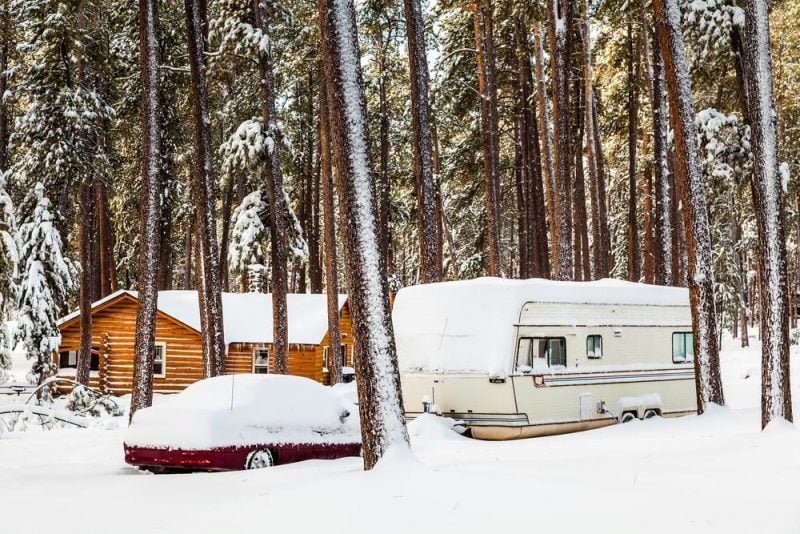A Basic Guide to RV Camping in Winter
Do you love RV camping? Then, why let the winter stop you?
Despite the shorter days and freezing weather, camping in winter is actually tons of fun. There’s a different kind of peacefulness in the atmosphere that only snow and low temperatures can bring.
In fact, some people enjoy winter camping more than in summer. Think about it – you won’t be dripping in sweat and there are no bugs around to bother you either.
So, cast aside your second-guessing, and start planning. Here are a few tips on how to prepare your RV for a winter camping trip.
Make Sure the RV Exterior is Well Insulated
Recent RV designs are good enough for winter on their own. However, if you’re not the owner of an up to date RV, you’ll have to tackle the insulation yourself.
You know that beautiful skylight you have to enjoy the stars? Yeah well, it’s the perfect place for cold air to get in. So, seal those off, along with any vents, wall cracks, and window seal spaces.
It’s also a good idea to replace irreparable door panels and strippings, or you’ll constantly be shivering in the cold. Consider installing dual pane windows and investing in some quality insulating curtains or window film as well.
You can also go the DIY route and place foam boards on the bottom and slides of your RV. lining the back of your cabinets with Reflectix is also a good way to keep cold drafts away.
Prevent Your Water Supply from Freezing
Water is one of the first things of concern when you’re RV camping in the cold. So, it’s always a good idea to stock up on bottled water for cooking and drinking purposes. And if you don’t already have a heated water tank, make sure to pour some RV antifreeze into your tank.
Keep your RV water hose disconnected and away from the snow and ground. You could also install a galvanized steel or heated water hose to prevent freezing. Incase of mildly cold weather, wrapping some heat tape around the hose will work as well.
If your water pump is in a separate storage area, you might consider placing a small heater near it. It’s also important to keep a tap slightly opened at all times. This will keep water flowing through the lines and prevent freezing.
Install Sufficient Heating Measures
Winter in the outdoors means you’ll have to take as many measures to stay as warm as possible. Your RV is supposed to have a furnace, which you should definitely get checked.
Make sure it’s well maintained and there’s no dust or debris, or it will damage its functioning.
If your furnace isn’t powerful though, you should definitely invest in a catalytic heater. This is much more efficient than furnaces, and safer too. You could also get a convenient electric space heater that works just as well.
But when you do have all these heating options, it’s important to keep your RV well ventilated. You don’t want to make your RV to get all condensed and foggy from your breath and the heat. So, keep a window or vent slightly open to prevent this.
You could also get a dehumidifier or moisture absorbent. This will remove the dampness and keep mold, mildew, and corrosion away.
Keep Your Refrigerator Running
You’re probably thinking storing food won’t be a big deal in winter. Well, unfortunately, this isn’t the case. Very low temperatures can actually mess with how your fridge functions.
Below 20 degrees Fahrenheit, the solution that keeps the food in your fridge cold could turn into a gel and damage the system’s coils. To prevent this, cover two out of three vents on the top with duct tape on the inside.
This will keep the cold air away.
Do the same for your thermostat, because it detects the cold air from outside and turns off the fridge. This will ultimately ruin all your food. But when covering your thermostat, make sure it’s done with nonflammable material.
Take Precautions
This may seem like an obvious thing to do – but it’s certainly one of the most important. Plan ahead of time and be prepared for all sorts of scenarios.
For instance, some campground might be closed during winter, so don’t head out without doing your research.
When you do go camping, be sure to check the weather forecast and how cold it might get. Make sure you are equipped to deal with extreme weather cases and emergencies.
In fact, it would actually be wise to get a professional to check your heating systems, gas, water, etc. before you go camping.
Pack extra blankets and thermal wear. Trust me, you’ll want to stay bundled up inside. Also, keep a winterized Emergency Kit box ready. Other than the basic medicines and first aid, you’ll need to have tools like a windshield ice scraper in there too.
Extra Tips
While there’s a lot you can do to prepare for the cold, here are some extra tips that will help you out –
- Place wood blocks below your stabilizing jacks, instead of paved or concrete pads. This prevents the jacks from freezing and staying stuck to the pads.
- Having a hairdryer with you in your RV will come in really handy. You can use them to melt frozen water hoses and satellite dishes.
- Be careful about your RV’s deep cycle battery. To prevent it from freezing in the winter, keep your battery fully charged. It’s also wise to get an insulating cover for it.
- Choose your RV parking spot wisely. Try to pick the sunniest space, if possible. You should also keep the wind direction in mind, and park somewhere that is wind-free. If it is windy, make sure the force doesn’t hit the sides of the RV.
Final Thoughts
If you’re bold enough to go RV camping in the winter – you’re truly one of a kind. Sure, it might be a little cold, but rest assured, you’ll always cherish the fun memories and the beauty of nature in winter.
Just make sure you make you know what you’re doing and be prepared. By following the tips above, you’ll surely be able to handle any sort of weather that comes your way.



